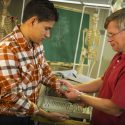Graduate science education program to expand to more universities
The UW–Madison-based Center for the Integration of Research, Teaching and Learning (CIRTLCIRTL) has received a three-year, $5.1 million grant from the National Science Foundation (NSF) to expand a campus science education program to five other major research universities.
The UW–Madison Delta Program in Research, Teaching and Learning started nearly five years ago as the prototype program of the NSF-funded multi-institutional CIRTL initiative, which strives to improve preparation of future college faculty for teaching science, technology, engineering and math.
The new grant will support expansion of the initiative to the partner institutions of the CIRTL Network, which include Michigan State University, Howard University, Texas A&M University, University of Colorado at Boulder and Vanderbilt University.
“Each of the new institutions will build on the successes of the Delta Program, as we will learn from them,” says Robert Mathieu, CIRTL director and co-faculty director of the Delta Program.
UW-Madison students will greatly benefit from the CIRTL Network, he says. “We plan to build a cross-network learning community so that graduate students at UW can expand their experience base in teaching and learning to encompass a diverse range of institution types. Many of our graduate students will become faculty at universities and colleges much different than UW–Madison,” Mathieu says. “Our plan is to use the network connections to enhance both their disciplinary research and their preparation to be future faculty.”
Tags: Graduate School, learning, teaching



